Water company schemes to consider for your farming business
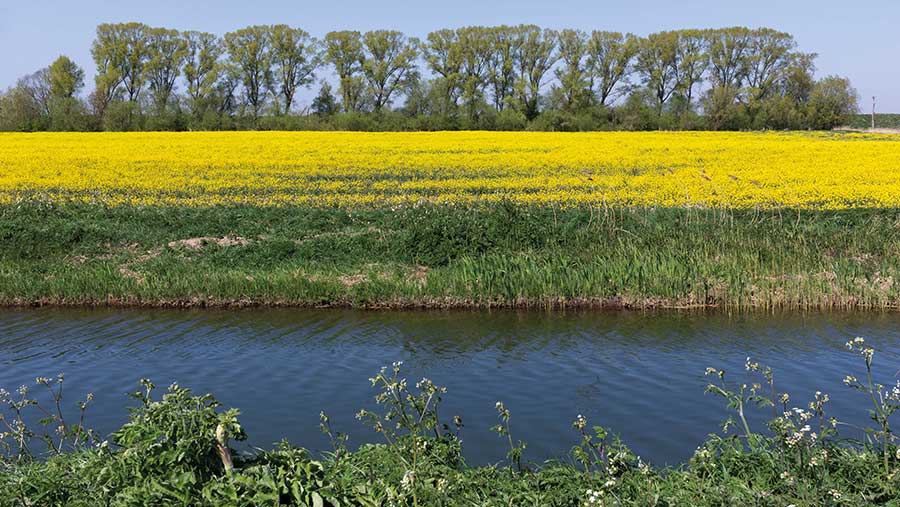 © Tim Scrivener
© Tim Scrivener Catchment areas in the UK are largely dominated by land put to agricultural use, which makes collaboration between water companies and farmers essential for preserving raw water quality.
Water companies across the country operate various schemes that work closely with farmers to not only help meet water quality goals but also improve the farm’s bottom line.
Affinity Water
Areas covered:
- Bedfordshire, Berkshire, Buckinghamshire, Essex, Hertfordshire and Surrey
- The London Boroughs of Harrow and Hillingdon and parts of Barnet, Brent, Ealing and Enfield
- Also supplying to the Tendring peninsula in Essex, as well as Folkestone and Dover in Kent
Key concerns include nitrates, pesticides and other biologicals entering watercourses. Affinity Water offers a number of incentives to work alongside farmers to address these issues at source.
Among these is Affinity’s own Soil Innovation Fund, which is designed to improve soils to the advantage of both farm productivity and preventing run-off and other water-related issues associated with poor soils.
Danny Coffey is an agricultural adviser at Affinity. “The scheme allows farmers access to anything that they see will improve their soils – it’s a very flexible scheme,” he says.
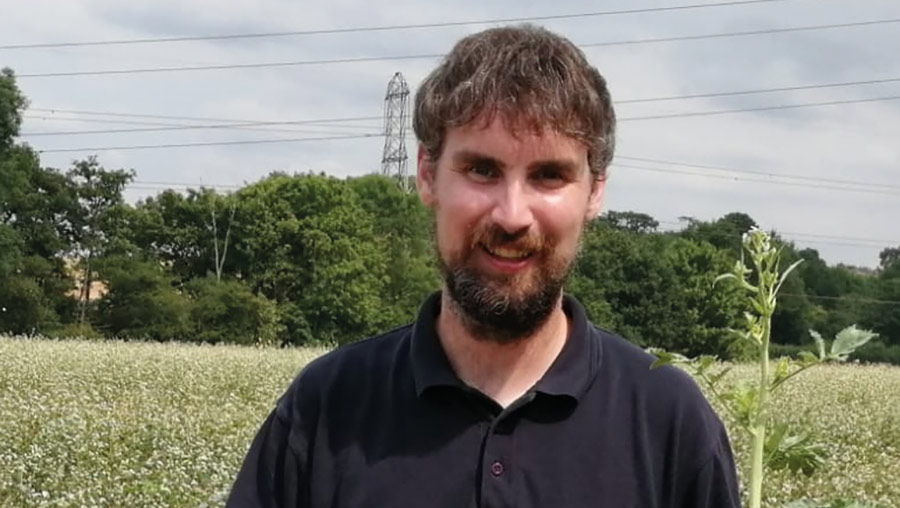
Danny Coffey © Affinity Water
The ideas pitched are then put to a panel – which includes soil scientists, regenerative agriculture specialists and representatives from the water industry – and are assessed based on the merits and awarded grant funding accordingly.
Funding can cover up to 75% of project costs, to a maximum value of £15,000. Previous projects have included machinery modifications, precision injection of fertiliser and support for undersowing maize.
This funding is supplementary to other schemes run by Affinity, which include grants for cover cropping, oilseed rape companion cropping and alternative cropping to oilseed rape, with the overall aim of targeting pesticide and nitrate issues.
Anglian Water
Areas covered: East of England and Hartlepool
Protecting resources in one of the driest regions of the UK is a priority for Anglian Water.
The firm has a dedicated team of agricultural and catchment advisers who work with and alongside farmers, landowners and agronomists to ensure pollution does not enter watercourses.
Leaching nitrate and phosphorus fertilisers causes some of the biggest issues in the area.
The company has run a number of projects with local farmers, providing advice and support on everything from slug control to using drip trays with pesticides – and even a pesticide amnesty.
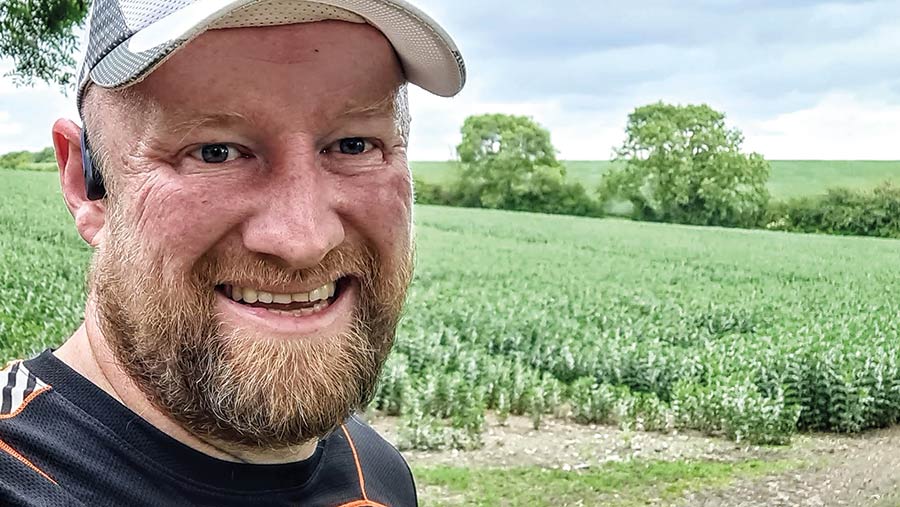
Richard Reynolds © Anglian Water
In terms of grant support, Anglian Water’s Farming Innovation Grant has now provided two rounds of funding to develop innovation solutions that tackle local water quality challenges in priority areas across the catchment.
In its first year, the grant programme gave farms in the area access to more than £250,000 worth of funding, which was split across 19 projects.
The application window for this year’s funding is now closed, but Anglian Water is keen to continue hearing ideas from farmers.
Last year, the company also offered a training grant and cover crops grant, which provided funding for more than 120 farmers in the region.
Senior agronomy adviser Richard Reynolds says: “Ultimately, we believe local farmers are best placed to understand their local needs and challenges so try avoiding generic funding programmes that pay a fixed rate for a specified item.
“We want to put farmers as part of the solution, not the problem.”
Bristol Water
Areas covered: Bristol city and north Somerset, as well as parts of Bath, north-east Somerset and South Gloucestershire
A large proportion of dairy farms in the area mean Bristol Water’s work with farmers centres on controlling nutrient concentration levels.
Matthew Pitts is the firm’s catchment strategy manager. “My main focus is on the Mendips. We have three big reservoirs there – Chew Valley, Blagdon and Cheddar,” he says.
“In these areas we’re trying to maintain nutrient concentration at a lower level so that we don’t get algal blooms. The algal blooms are what makes the water difficult for us to treat.”
Farmers can get a free specialist consultation on how they can protect local resources through the long-standing Mendip Lakes Partnership – a collaboration between Bristol Water, Catchment Sensitive Farming, Avon Wildlife Trust, Natural England and the Environment Agency.
This partnership gives farmers access to a number of other free tools including:
- Soil analysis and management advice, as well as manure and slurry nutrient value analysis
- Nitrate vulnerable zone compliance checks
- Nutrient management planning from a Fertiliser Advisers Certification and Training Scheme (Facts) qualified adviser
- Grant application support advice.
Bristol Water also offers a grant scheme.
“We have a pot of money set aside for farmers to apply for to make improvements to their farm that will reduce the risk of pollution or enable them to manage their nutrients better, for example,” explains Mr Pitts.
This funding in general covers up to 50% of an investment up to a maximum value of £10,000.
Cambridge Water
Areas covered: Cambridge, extending as far north as Ramsey, west to Gamlingay, down to Melbourn in the south and over to Balsham in the east
Last year saw the extension of the Slug Pesticide Rethink – Ideas for Nurturing Growth (Spring) grant to farmers in Cambridge Water catchment areas, after continued success since its launch in 2016 by South Staffs Water. Both companies are part of South Staffordshire Plc.
The grant is designed to help farmers improve practices to prevent pesticides and fertilisers entering watercourses.
It offers up to £10,000/year a farm, with the funding going towards voluntary on-farm infrastructural improvements and land management options, or a mixture of both.
Applications can include cover crops, buffer strips, nectar pollen and wild bird mixes, as well as concrete yard renewal and funding for chemical handling and/or storage areas.
Most recently, a range of options to improve biodiversity have been added. These include funding towards soil testing, spreader and sprayer calibration and rainwater harvesting.
Senior catchment adviser Nina Yiannoukos-Benton says she is particularly keen to speak to farmers in priority catchment areas, which includes Babraham, Fleam Dyke, Fulbourn, Linton and Sawston, Euston and Brettenham, and Fowlmere.
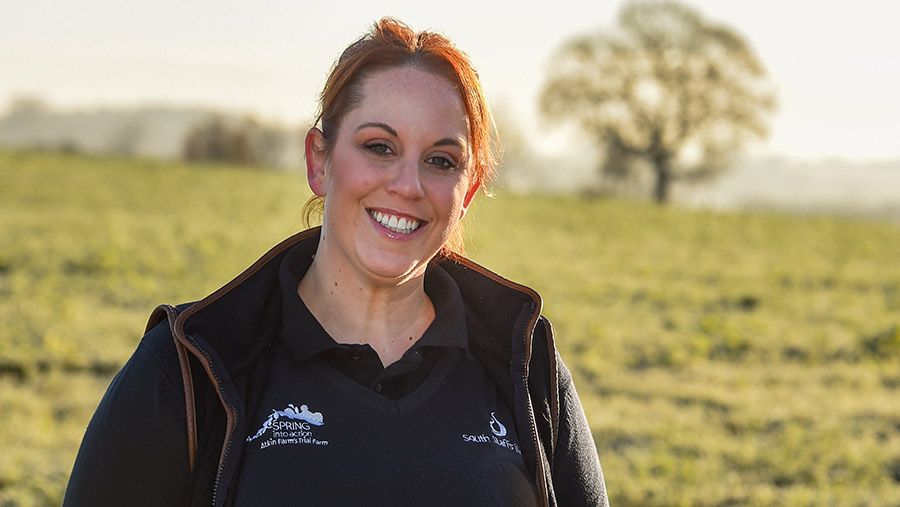
Nina Yiannoukos-Benton © South Staffs Water
In addition to the Spring scheme, Cambridge Water also runs a number of collaborative initiatives that farmers can get involved with.
One of these is the Granta project, which revolves around the River Granta in south Cambridgeshire.
It aims to identify and implement nature-based solutions to minimise flood risk while maximising both the water quantity and quality in this chalk stream.
Dwr Cymru (Welsh Water)
Areas covered: Most of Wales and Herefordshire, as well as parts of Deeside
Dwr Cymru’s package for collaboration with farmers and landowners is known as WaterSource and comprises a number of measures to protect raw water sources.
“These programmes are specific to each catchment, and feature farmer-led discussion groups supporting innovations and novel approaches to land management, developing decision support tools – such as weather stations – and peatland restoration,” explains project manager Nigel Elgar.
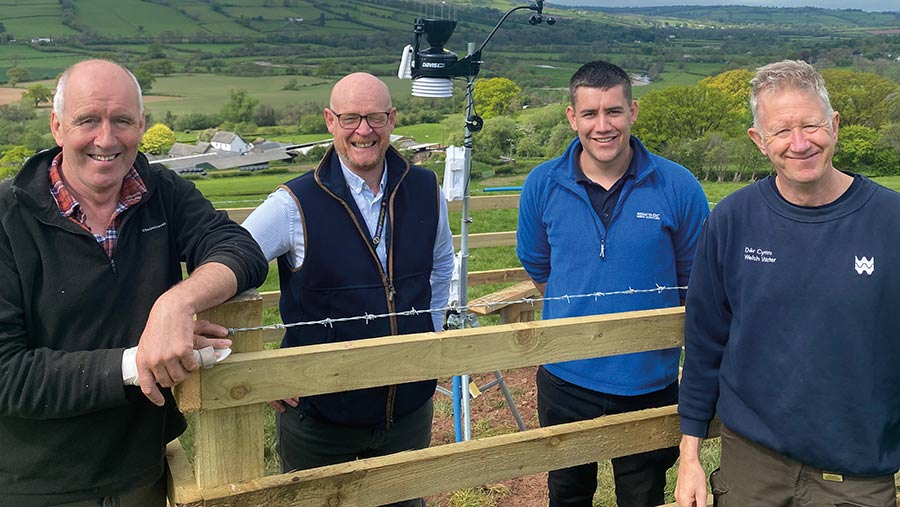
Richard Roderick, John Owen, Iwan Jones and Nigel Elgar © Dwr Cymru
The Pendine Catchment Project is one such programme.
Working with farm consultants at Adas, it enables farmers to claim a farm health check, which can provide free advice such as identifying risk areas in fields, or options for slurry and silage storage, and clean and dirty water separation systems.
Last year, the water company also partnered with the Wales Federation of Young Farmers’ Clubs to facilitate knowledge exchange on protecting raw water with the next generation.
Northern Ireland Water
Areas covered: Sole provider of water services in Northern Ireland
A new farm chemical disposal scheme was launched by Northern Ireland Water last year for farmers in the River Derg catchment area of County Tyrone.
This scheme gave farmers free access to farm-to-farm collection of any unwanted chemicals and pesticides such as fungicides, sheep dip and veterinary medicines.
The scheme was relaunched again in December in the same area with plans to roll it out across the country in the future.
Also in the Derg catchment area, the recently concluded five-year Source To Tap project involved a pilot scheme to provide 100% grants to farmers looking to reduce pesticide and sediment loss through changes to management practices.
Alongside other water companies last year, Northern Ireland Water helped develop an online water quality training module for the national Basis classroom – a web-based resource for farmers across the UK – to advise on sustainable land management.
Northumbria Water/Essex and Suffolk Water
Areas covered: Northumbria Water – Tyneside, Wearside, Teesside, Northumberland and County Durham; Essex and Suffolk Water – Chelmsford, Brentwood, Romford, Tilbury, Basildon, Southend, Havering, Redbridge, Hanningfield, Langford and the London Boroughs of Barking and Dagenham; in Suffolk, supply is available to Barsham, Walpole, Southwold, Lowestoft and Great Yarmouth
Catchment advisers in the Northumbria Water/Essex and Suffolk Water areas work with farmers on a one-to-one basis.
Through farm audits they can help identify measures in the farmyard or the field that could improve raw water quality.
“Catchment management is really important if we’re to try to at least maintain raw water quality, but ultimately improve it,” explains company spokesperson William Robinson.
The implementation of eligible improvements can be funded with capital grants from the company as part of its Field to Tap scheme, which is focused on minimising risk of key polluters such as nitrates, pesticides and cryptosporidium.
Money available for up to 50% of investment and grants to date have funded measures such as concrete hardstanding in yards, biobeds and precision fertiliser application equipment.
Where and how this funding is spent can be flexible, adds Mr Robinson, who says farmers with ideas that could have a benefit to water quality are encouraged to get in touch.
The company also carries out trial work on areas such as reducing nitrogen losses from soil to groundwater and are keen to work alongside farmers to test technology such as nitrogen inhibitors and cover crops.
Scottish Water
Areas covered: All of Scotland
Scottish Water works with land managers through its sustainable land management team to assess and make recommendations about land activities that take place near drinking water sources.
To safeguard these areas further, the organisation also has a Drinking Water Protection scheme, which covers specific areas within drinking water catchments.
Farmers can ask for an on-site visit from advisers to identify potential improvements that could enhance water quality.
Where applicable, the scheme will finance the investment at up to 100% of the cost.
Measures available cover a range of capital and management options including biobeds, stock fencing and the resurfacing of gateways.
SES Water
Areas covered: Surrey, Kent and south London, from Morden and south Croydon to Gatwick airport and spanning from Dorking to Edenbridge
Though it does not have a formal grant scheme, SES Water is keen to hear from farmers who are interested in investing in mutually beneficial, sustainable, catchment-based solutions to prevent pollution entering watercourses.
The company has a dedicated catchment team, which includes a scientist and a consultant, who work closely with farmers in the area and host on-farm walks and visits.
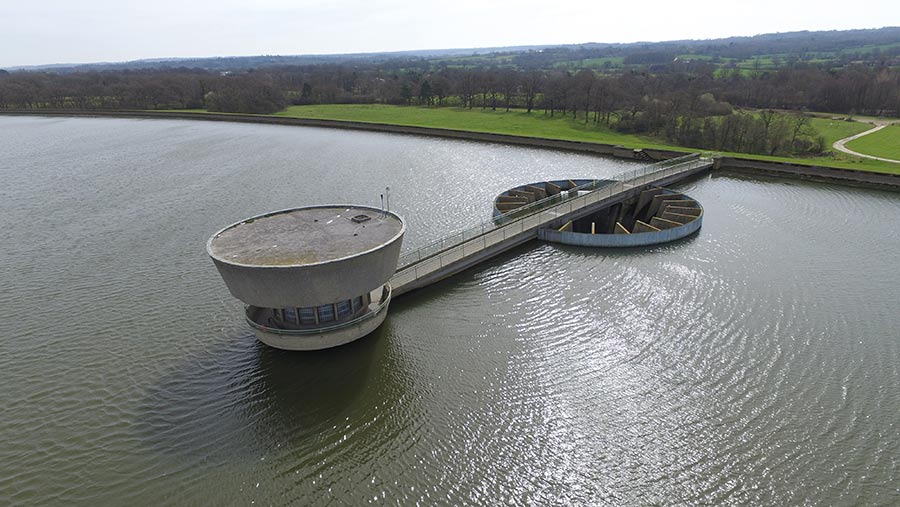
© SES Water
Catchment manager Ria Woodfield says: “Our key concerns in the catchment are primarily around autumn-applied herbicides – things like propyzamide and flufenacet.
“The other area we have a lot of issues with is nitrates in the water. These are our two key water qualities that we want to address [through funding].”
Past solutions have included funding the installation of biobeds on farm.
Severn Trent Water
Areas covered: Bristol Channel to the Humber and from mid-Wales to the East Midlands
Over recent years, Severn Trent Water has launched a plethora of schemes, workshops and grant funding in a bid to work more closely with farmers in its catchment areas.
All of these come under the firm’s Regenerative Pathway Package, which is designed to help farmers protect and improve rivers.
Set to close on 31 January, the Severn Trent Environmental Scheme is offering farmers and landowners grants of up to £30,000 to put towards farm improvements that will help reduce water quality issues.
Priority funding is reserved for farms in catchment areas where pesticide reduction is paramount and is designed to go towards washdown and disposal areas.
For farmers outside catchments where pesticide reduction is a priority, maximum funding of £10,000 is up for grabs.
Over December and January, Severn Trent also held free virtual training workshops on improving spray efficiencies – with participating farmers able to claim a set of low-drift spray nozzles upon completion of the course.
One final Swap Your Nozzles session will be held on 24 February and is open to all farmers in Severn Trent pesticide priority catchment areas.
Training covers a variety of topics from legislation, buffer zones and local environment risk assessments for pesticides, to nozzle selection and application decision-making.
Southern Water
Areas covered: Kent, Sussex, Hampshire and the Isle of Wight
Southern Water offers a number of support options for farmers as part of its Catchment First commitment to improve and protect water and the surrounding environment.
For eligible catchments, Southern Water runs a farm capital grant scheme as part of its Water for Life programme.
Funding can cover up to 50% of the purchase cost, up to a maximum value of £10,000, and is targeted at reducing nitrate and pesticide risks to water quality by investment in more sustainable land management practices.
Southern Water also funded the soil health monitoring of eight farms over five years in one of its catchment areas – an initiative that in ended 2021.
Findings were used to better understand the impact of different cropping and management strategies on both soil health and nutrient availability and the influence this may or may not have on water quality.
Case study: Partnership bolsters farm business resilience
Farmers working with Anglian Water are being encouraged to build their business resilience by managing and monetising their natural capital.
The water company has joined forces with Trinity AgTech to offer farmers a trusted and scientific solution to optimising soil health.
“Farmers can monitor and, where necessary, make informed decisions to improve their soil health and keep inputs on the field.
“That inevitably improves drinking water quality and farmers gain from a business productivity perspective,” says Anglian Water catchment adviser Chris Hewis.
Trinity AgTech’s natural capital navigator Sandy is a software package that shows how changing farm management practices affects on-farm carbon sequestration, biodiversity and water quality so farmers can profit from their decisions.
This can benefit farm businesses as well as the environment, says Anglian Water senior agronomy adviser Richard Reynolds.
“The more productive and more economically sustainable farmers are, the better end result for water quality.
“Farmers are coming up against challenging times financially, so supporting them in making the most of their inputs is crucial to making sure their businesses stand the test of time,” adds Mr Reynolds.
Using Sandy to optimise soil health can increase both farm productivity and the soil’s water holding capacity, allowing better nutrient retention and reducing the risk of run-off.
“As a result, business resilience for both parties will be bolstered and everyone gains from a water quality and environmental perspective,” he says.
